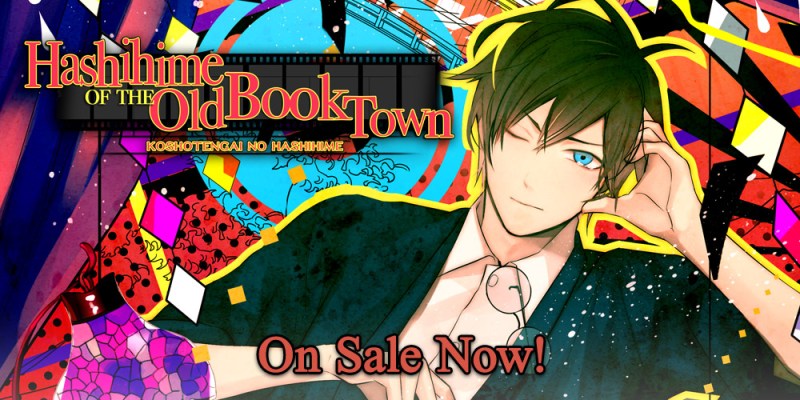
Today on the blog, we have a tester’s corner from Aki!
Hey, guys! It’s aki again, this time fresh off the beta boat for Hashihime of the Old Book Town. I expressed interest in this game upon seeing its art and knowing nothing else about it. I quickly learned two things: it has beautiful art and it’s gay. So hell yeah, you can bet I was on that shit.

I feel like there’s no way to really address any facet of this game without understating the sheer amount of consideration and care put into it. The character designs look a bit samey at first, but the lack of ridiculous anime hair really gives it that immediate sense of realism — you tell characters apart by subtleties rather than by the hues of their locks and the ornaments they’re decorated with. That’s the first thing I love about this game: the strength in the simplicity of the designs helps to lock you into a narrative that expands with each chapter, luring you in with mysteries and mythos that pique nothing if not your curiosity. If you’re not charmed by the cast (which, as I’ll talk about next, you should be), then you’ll probably be pulled in by the story.
I was stricken by this game’s character writing. I’ve played a lot of visual novels and I love nakige, but I don’t think I’ve ever experienced a game with characters quite as human as the ones in Hashihime. There are, of course, parts of them that are exaggerated to different ends, but what they feel is always undoubtedly rooted in something that you can comprehend as the player. Whether or not you would act the same, you know why they behave the way they do, which brings out a sense of respect from me toward the creator, ADELTA, for accomplishing such a feat.
The main character, Tamamori, is simply impressive in his characterization: he’s frustrating, he can be annoying, he’s selfish, he’s a dope, but he’s incredibly lovable and all of his flaws are traits that I could potentially see in myself. Being able to relate to a main character on a personal level like that really helps to engage the reader in a story, and Hashihime succeeds at that with flying colors.

I can’t go too much into plot without spoiling things, though. I’m of the personal belief that spoilers don’t spoil a story if the story is truly good, but with Hashihime, the slow trickle of data you’re fed and the information you garner with each passage is so clearly calculated that to disrupt that scripted flow would be a disservice to ADELTA’s hard work. With that in mind, I’ll keep my thoughts on the game as superficial as possible!
So LET ME TALK ABOUT THIS ART HOLY SHIT. Yeah, you saw it. You saw those colours. They were fuckin’ gorgeous, right? That’s right. One element of the game is the balance between reality and fantasy, illusion and materiality. Kurosawa Rinko (the game’s artist, planner, script writer, and designer) depicts that through her use of colors: the natural palettes evoke the rainy Taisho streets of Jinbouchou, but the fluorescent pop art springs the viewer into a completely different world. As you’d expect, it’s the divide between these two worlds — and the blurring of the lines — that make the story fascinating and the art breathtaking.

Now, there are definitely things I have to warn you about going in. It’s an eroge, so the likelihood of you playing it when you’re not comfortable with certain ~problematic~ topics is low, but I don’t want my effusive praise to lead anyone to reading a story that could be severely triggering: there’s a necessary content warning for murder, rape, abuse, suicide, animal cruelty, and pseudo-incest. There are some depictions of body horror and definitely discussions of depression, especially with regard to LGBT issues.
Oh, wait, did I forget to mention that? Yeah, this game somehow manages to be caring in its depiction of LGBT stories — it’s not just a game where dudes fuck dudes for the hell of it (not that there’d be anything wrong with that, either). It’s a game that thought, love, and research were poured into, and I think that shows when you play it. As an LGBT person myself, the first route of this game alone yanked on my heartstrings and played them like a gay-ass fiddle. If you’ve experienced the struggle of being LGBT, then this game may hit home for you, too. It’s complex, it’s emotional, and it’s, above all, sympathetic. At the end of each route, I found myself awash with all the feelings I’m positive ADELTA set out to instill in me, and I can’t even begin to overstate how great an experience that was.
Above all, I wish I could go back and play it blind once more, to experience that feeling of confusion, delight, fear, and intrigue that this game inspired in me. Considering it’s a game with the above-mentioned unsavory content and I STILL fucking adored it and don’t regret playing it? It’s absolutely worth it.

I may not be able to experience it for the first time again, so I can only hope that maybe this corner will convince you to give it a shot yourself. I truly hope you love it.
…hitotsurugi best girl btw





